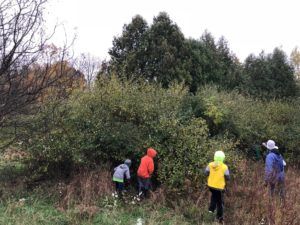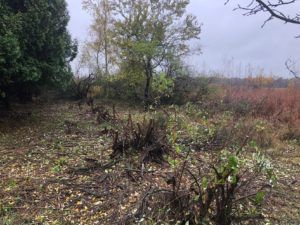OTG Jr: Morrice Elementary Volunteers at Rose Lake SGA
Written by MUCC Habitat Volunteer Coordinator, Makhayla LaButte
On Tuesday, October 29 and Wednesday, October 30, two groups containing 53 fifth grade students, teachers and chaperones from Morrice Elementary removed large groves of invasive autumn olive and other woody brush from a portion of the Rose Lake State Game Area. The project site was the location of the old DNR field office along Stoll Road until its recent removal, and the DNR has plans to restore the site to native grassland habitat and increase user access to the area with a viewing platform overlooking Rose Lake. However, before the DNR can accomplish this, much of the invasive woody brush needed to be removed from the area.
The volunteers from Morrice Elementary worked through wind and rain to accomplish the project, and by the end of the workday on Wednesday, more than 5 acres of wildlife habitat had been improved through their efforts. The only invasive woody brush left standing were those too large in diameter to be removed with loppers and hand saws, and these trees will be removed with chainsaws by wildlife professionals before the site is restored. To further enhance wildlife habitat in the area, the woody brush was stacked into brush piles following its removal to serve as rabbit habitat (“rabbitat”). Students spent the remainder of the afternoon at the Glassen Education Center at the Rose Lake Shooting Range learning waterfowl identification and practicing shooting archery.

Morrice students starting the autumn olive removal project on Tuesday, October 29.

The project site after the Morrice students completed the autumn olive removal on Wednesday, October 30.
This OTG Jr. event officially wraps up the OTG field season for the next couple of months. We appreciate all of the hard work our OTG and OTG Jr. volunteers completed during 2019, and we look forward to returning to the field for more habitat projects in the upcoming winter of 2020. Thank you to Morrice Elementary students for all of their hard work this week and to all of our 2019 volunteers for improving wildlife habitat on public land across Michigan.
If you have any questions or ideas regarding the OTG or OTG Jr. programs, please reach out to MUCC Habitat Volunteer Coordinator Makhayla LaButte at mlabutte@mucc.org.
The post OTG Jr: Morrice Elementary Volunteers at Rose Lake SGA appeared first on Michigan United Conservation Clubs.
Recent Posts



